What is Greenwashing? A Definition:
Greenwashing is when an organization shares false, misleading, or deceptive statements about its environmental sustainability or climate actions. Greenwashing can be intentional or accidental.
Greenwashing is a critical term for false or manipulative marketing, communications, and business practices coined by environmentalist Jay Westerveld in 1986. On a college research trip, Westerveld went surfing near a resort, and saw an advertisement asking customers to pick up and reuse their towels to "protect the oceans and help the environment." Westerveld noticed the resort was actively expanding through various construction projects around the island which were causing far more negative environmental impact than towels.
The observation stuck with him, and when he got back to school, Westerveld wrote "It all comes out in the greenwash" in a paper. A classmate asked him to write another essay about greenwashing in a popular literary magazine. Soon after, 'greenwashing' was picked up by the media, and has become a top call-out for bad environmental behavior ever since.
Why is Greenwashing a Problem?
As the global climate crisis worsens - and the need for climate action gets more urgent - protecting the environment and leading an eco-friendly life has grown in cultural importance and mindshare. 66% of U.S. consumers will pay a premium for sustainable products, and demand for sustainable food, fashion, beauty, lifestyle, and consumer goods are at all-time highs. Sustainability sells, and companies have noticed.
As a result - to attract more customers, get more attention, or seemingly improve their public brand image - many companies are increasing their investment and focus around sustainability. In some cases, this work can be authentic, impactful, and important - it's not greenwashing when a company's genuinely trying its best and reduce its environmental footprint. But all too often brands focus more on marketing and talking about sustainabilty than actually doing it, and that leads straight to greenwashing.
Why is greenwashing so bad? For starters:
- It diverts focus from real climate problems - Climate change and biodiversity loss are critically serious problems. Greenwashing spends money and attracts attention on hype and misdirection, rather than real solutions
- It misleads consumers - Greenwashing uses spin and false advertising to take advantage of people and direct them toward bad decisions and lower-quality, more harmful products
- It destroys public credibility - Ironically, greenwashing usually accomplishes the opposite of what it's intended to do. Greenwashing companies are usually trying to improve their brand with misleading or inaccurate claims, but usually end up getting called out and seeing their brand suffer for it
- It's a bad investment - At a time when there are so many opportunities to innovate and create better, more sustainable products and services, greenwashing wastes money reinforcing a dangerous, business-as-usual status quo
Often, greenwashing is based on contradictions like "clean coal", plastic-based "vegan leather," or "sustainable consumption," marketing taglines that are inconsistent with the reality of pollution, climate change, and global warming. In the past year alone, companies like Walmart, McDonald's, Whole Foods, Coca-Cola, Windex, Nestle, Ford, BMW, and Keurig have all been accused of greenwashed advertising, according to the Federal Trade Commission (FTC) and the Advertising Standards Authority.
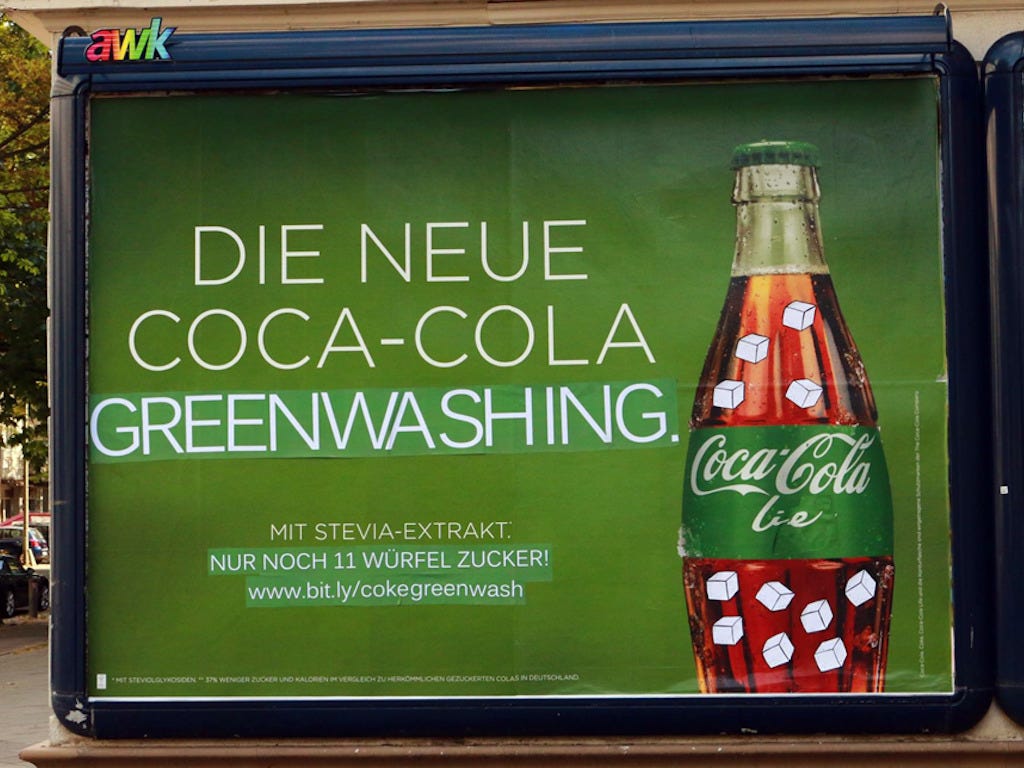
An example of a Coca-Cola ad called out for greenwashing in Germany
Notorious Examples of Greenwashing
Examples of greenwashing are sprinkled throughout the history books of modern marketing and advertising, but some are particularly audacious and harmful.
Chevron, Exxon Mobil, and Fossil Fuel Companies
Fossil fuel companies are consistently some of the worst greenwashing offenders. Exxon Mobil, a company whose Scope 3 emissions are equal to Canada the country's entire carbon footprint, regularly promotes misleading tweets, Instagram posts, and other ads about its alleged 'sustainability'.
In one greenwashing post, Exxon highlighted its 'carbon capture leadership,' describing how the company's "captured the most CO2 of any company" in the last 40 years. The problem? Exxon also created record amounts of carbon pollution during that same period - far beyond its carbon capture.
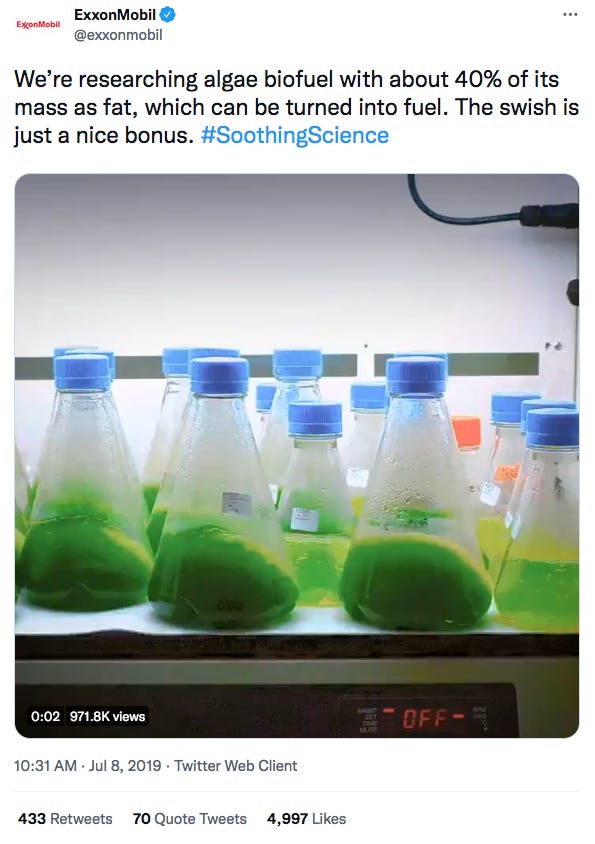
Source: Twitter
In the last five years, multiple states and over a dozen cities have sued Exxon and other fossil fuel companies over their contribution to — and alleged deception about — the dangers of global warming and climate change.
In fact, data analyzing BP, Chevron, Exxon Mobil, and Shell's corporate communications show that all four companies are talking more and more publicly about climate change and low-carbon energy, without taking any concrete steps or actions to reduce their carbon footprint or transition their business models away from fossil fuels.
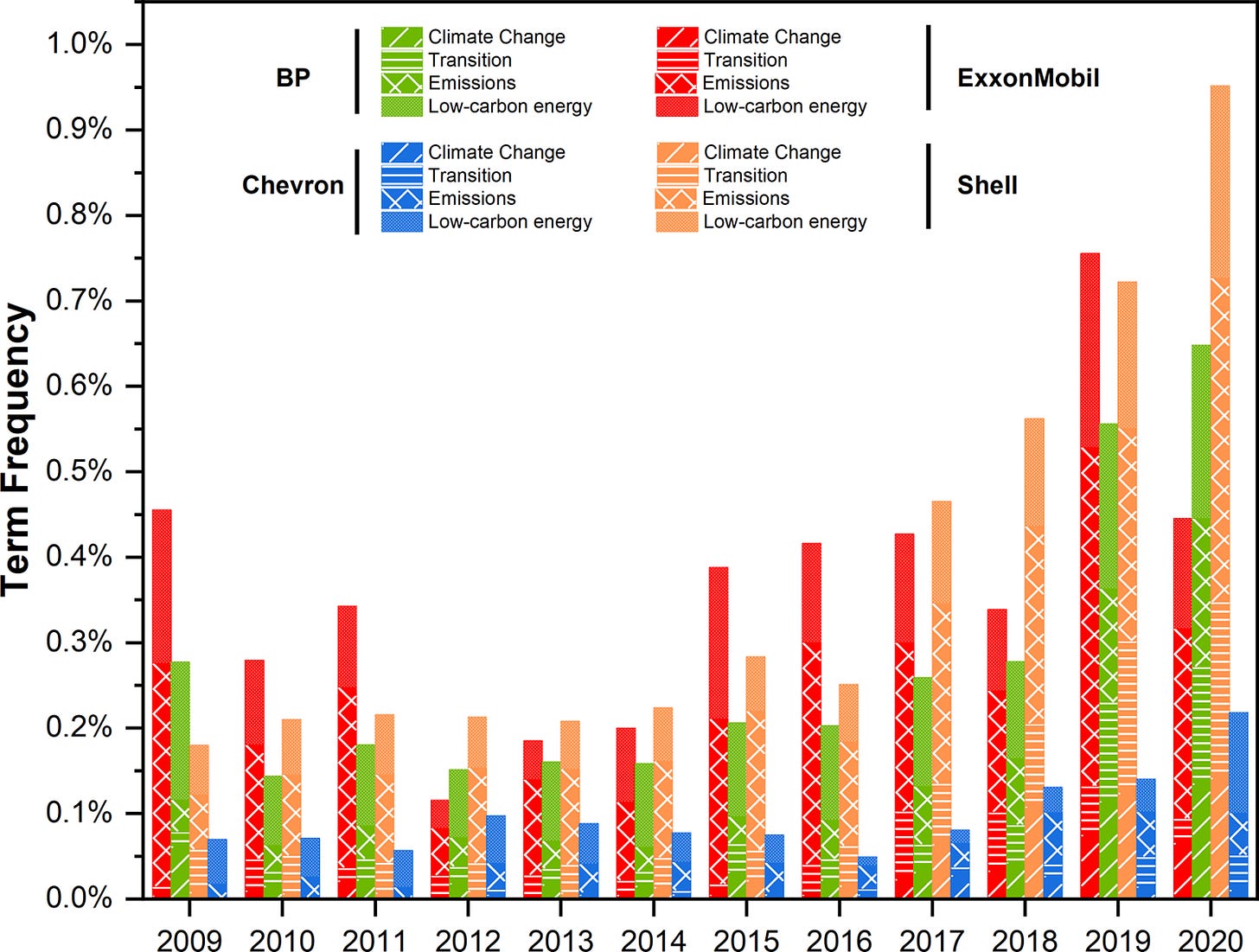
Source: "The clean energy claims of BP, Chevron, ExxonMobil and Shell: A mismatch between discourse, actions and investments", Mei Li, Gregory Trencher, Jusen Asukav, 2022
Volkswagen
Another recent, headline-grabbing example of greenwashing was when Volkswagen admitted it cheated on car emissions tests in 2015. While the company publicly advertised low-emission and eco-friendly features, its cars were actually breaking emissions laws for years.
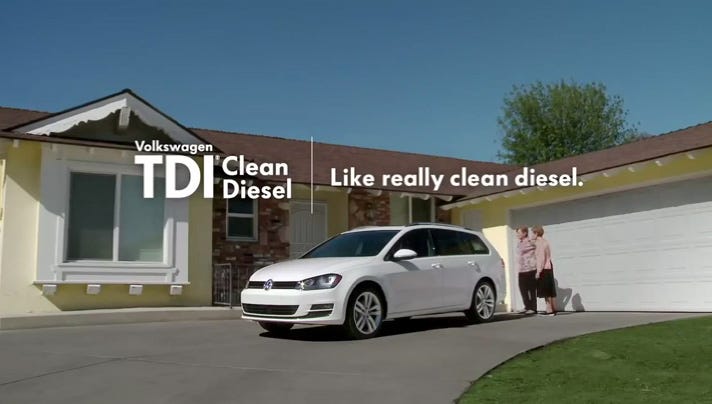
Source: Volkswagen
According to the EPA, software in 36,000+ Volkswagen cars would put the vehicle in 'safety' mode when it was being tested, causing the engine to run below normal power performance. When driven on the road, the engine switched out of test mode and operated normally, causing it to emit nitrogen oxide pollutants up to 40 times higher than the U.S. legal limit.
Fast Fashion Brands
Fast fashion supply chains cause lots of environmental harm, including high levels of upstream water consumption and pollution, as well as downstream emissions from incinerated textile waste.
But that reality hasn't stopped many fast fashion brands from trying to greenwash away their image. In 2019, H&M publicly launched a new 'Conscious Collection' line, which displayed green tags touting "sustainable fashion innovation" without any data or evidence to back up the claims.

H&M's alleged eco-fashion was quickly flagged by agencies like the Norweigian Customer Authority (NCA) for "misleading" marketing. According to the NCA: “the information given regarding sustainability [by H&M] was not sufficient, especially given that the Conscious Collection is advertised as a collection with environmental benefits.”
How to Identify, Analyze, and Call Out Greenwashing
You don't need to be a sustainability expert to bust eco myths. Whether it's as a customer, employee, or industry peer, calling out greenwashing helps hold companies accountable and challenges them to pursue more genuine sustainability efforts.
Here are some of the best ways to spot greenwashing:
- Look at the fundamental business model - At a basic level, ask yourself what the company does. How does it make money? Many businesses and industries are fundamentally emissions-intensive, like aviation, fossil fuel energy, gas and diesel-based transportation, and industrial agriculture. Yes, we need to transition all of these sectors and significantly reduce their emissions, but we need meaningful transition actions, not statements. If an energy company's spending 1% of its budget on "sustainable innovation" and keeps spending the other 99% destroying the planet, they're greenwashing if they try to focus your attention on that 1%. Look at the big picture in terms of what their business does
- Follow the money - One of the most common greenwashing dynamics is when a company spends more money on marketing and advertising their 'sustainable' products and solutions than actually making them sustainable. Did a company make a $500,000 donation to a climate cause, then spend $5 million dollars on an advertising campaign to tell us about it? Is a company highlighting 'sustainable' products front and center in its marketing when they only make up a tiny faction of what they do? Did a company put solar panels on their office roof while their main factory down the street generates 10x the emissions? That's greenwashing
- Be skeptical of sustainable 'innovation' when there's no proof, evidence, or data - Greenwashing companies love to highlight innovation in the hopes we'll be won over or distracted by the next new shiny object, rather than looking under the hood at the substance behind their claims. When brands talking about "eco-friendly packaging" or "sustainable fuel" don't accept it at face value without real proof, and remember to look at these innovation announcements through the lens of their entire business
- Be wary of green buzzwords - Companies and products often claim to be environmentally responsible by using words like "green", "eco-friendly", "energy-efficient", "sustainable", "vegan", "conscious," or "bio-something." Usually these words are used with no explanation, data, research, or certifications backing them up. If you don't see or can't find proof, it's probably greenwashing
- Ignore irrelevant sustainability claims and communications - Going back to Westerveld's 're-using towels to save the ocean' example from the 1980's, a key principle in sustainability is materiality. In other words, is this actually meaningful? Big picture, does this really matter? If a company's main business model is putting millions of plastic bottles into oceans and landfills each year, but you see its employees picking up a few dozen bottles in a park or beach cleanup on social media, that's greenwashing
- Look for trusted verification - Remember, if a company's actually doing sustainable things, it should be verified by a credible, respected third party. Look for labels from established certifications like 'ISO 14024', 'Fair Trade', 'Energy Star', 'Green Seal', 'B-Corp', 'Fair Labor Association', and 'OEKO-TEX'. Certifications aren't perfect, and there are differences across sustainability standards ("standardswashing" can be another form of greenwashing itself), but, generally, these specific certifications are all based on audits, evidence, and honest third-party reviews. This makes them far more trustworthy than greenwashed marketing slogans.
- Compare against the most sustainable options - No company's perfect, but there are clear leaders in many sectors who have a proven, multi-year history of sustainable corporate decision-making and product development. Common examples include companies like Patagonia, Seventh Generation, TerraCycle, American Water Works Company, and Vestas Wind Systems. Are sustainability and circularity core parts of the company's purpose, business model, and day-to-day operations? Has the company set science-based emissions targets? Are they on track to meet them?
Ultimately, when it comes to greenwashing, the question to ask yourself is how sincerely and authentically is this company, brand, or product working to create real change? Does the company pursue long-term 'system' solutions or a short-term brand image 'solutions'? There's no harm to your brand reputation when you're transparently trying your best.
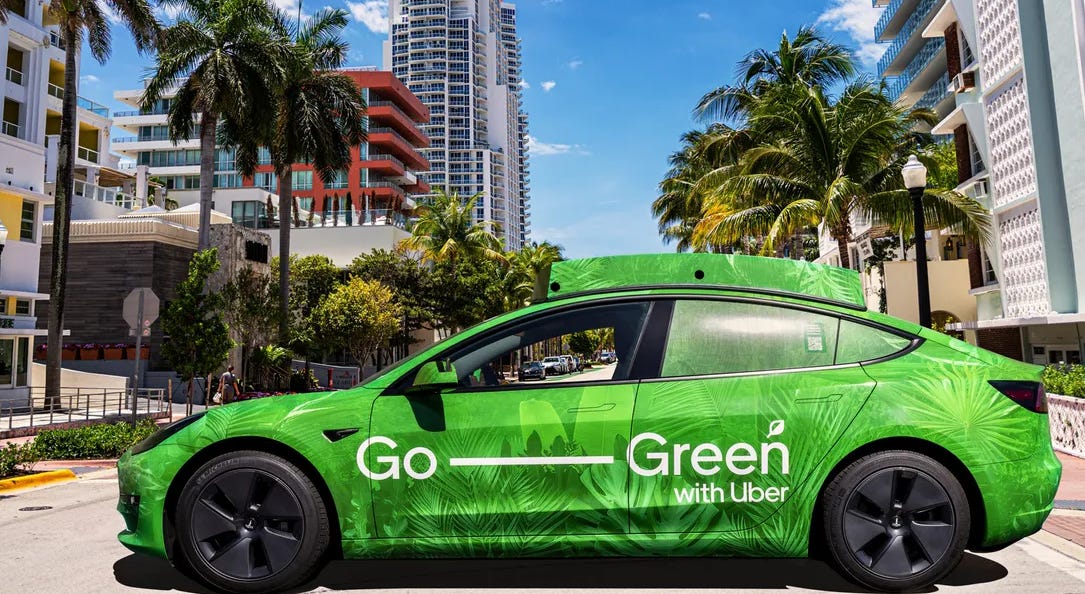
Yes, we need to electrify transportation and use more electric vehicles. Those are good things. But what % of Uber's cars are EVs?
In recent years, more and more regulators and governments have taken steps to combat greenwashing. Outright environmental deception is illegal in the United States, and the U.S. SEC's recently taken steps to standardize climate disclosure requirements and police false environmental claims. Europe and other countries around the world are also adopting new, anti-greenwashing laws to hold companies more accountable.
Recommendations to Help Your Organization Avoid Greenwashing
Whether you work in sustainability or marketing - or another part of the company - there are different steps you can take to protect and discourage your company from the downsides and backlash of greenwashing.
Some of this has to start with leadership. Does your company have a climate risk or sustainability strategy? For most companies, this initial awareness, materiality, and strategic alignment phase is the most important starting point. More often than not, companies resort to greenwashing to hide the fact that they don't have any real sustainability strategy.
From there, if you interface with marketing, communications, sustainability, or ESG directly, advocate that your organization drafts communications policies and guidelines around environmental claims and messaging. Make sure someone who's actually knowledgeable about environmental sustainability reviews and signs off on anything that might run the risk of greenwashing. Marketing should never have the last say when it comes to ESG communications.
Next, work with credible third parties to build trust around your organization's sustainability communications. Apply and undergo company and product sustainability certification reviews. Use consultants or sustainability software tools like Brightest to gather data and documentation to validate your claims. Be transparent and data-driven about your work and progress.
There can be lots of public pressure on companies to be sustainable. In general, that's a good thing. But don't cut corners to meet expectations you can't deliver on, or try to spin a dishonest image your company or products don't live up to. It's better to sincerely say "We're trying and working hard. Here's where we're at, we know we have work to do, but here's all the proof and evidence of our progress and investments so far" rather than greenwashing your sustainability performance with advertising or PR.
And, if you're an employee who isn't involved in communications and sustainability decision-making day-to-day, feel empowered to still make your voice heard. Ask what the company's sustainability strategy is (and watch for greenwashing). Propose the company sets up a sustainability committee or 'green team' with real accountability, decision-making authority, and employee participation. Organize your fellow employees. Constructively call out greenwashing if you see it and suggest better alternatives.
Today, more than ever, employees have real say and power in deciding how their company prioritizes climate and sustainability issues. Use that collective power.
At the end of the day, not only is greenwashing dishonest, it's also the epitome of short-term thinking. By comparison, sustainability is defined by long-term, regenerative value - just like organizational success. Don't try to spin it (just don't), go do the real work that actually makes your company better, stronger, safer, and more in line with a sustainable future for everyone.





